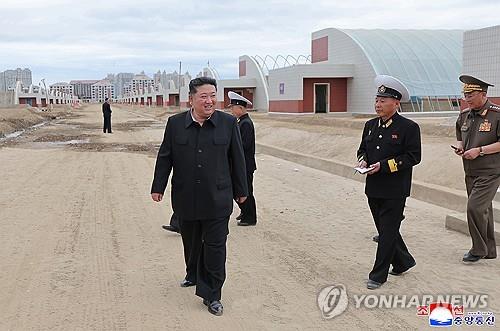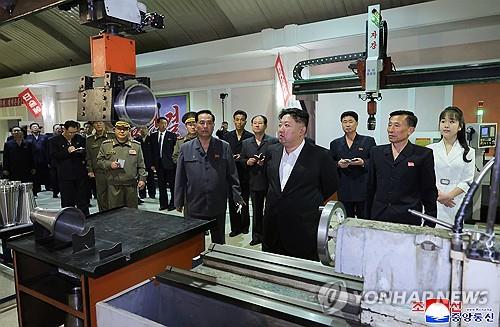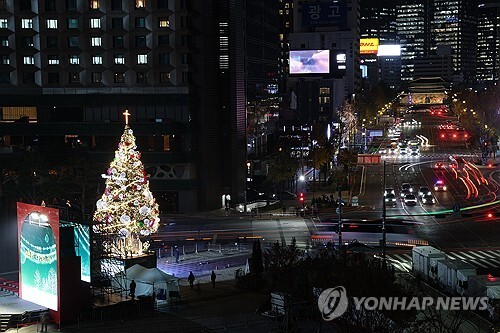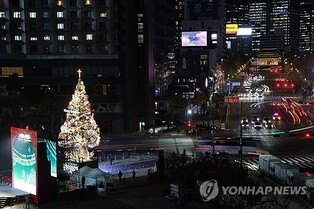 |
| ▲ North Korean leader Kim Jong-un (L) visits a greenhouse farm as part of his inspection of the facilities and construction of permanent embankments in the island areas of the country's northern border city of Sinuiju and Uiju County on Aug. 1, 2025, in this photo released by the North's Korean Central News Agency the next day. (For Use Only in the Republic of Korea. No Redistribution) (Yonhap) |
 |
| ▲ This file photo, carried by North Korea's official Korean Central News Agency on June 14, 2025, shows the North's leader Kim Jong-un (4th from R) inspecting a munitions factory the previous day to review the state of the production of artillery shells in the first half of the year. (For Use Only in the Republic of Korea. No Redistribution) (Yonhap) |
BOK-N Korean economy
N. Korean economy logs fastest growth in 8 years in 2024: BOK
SEOUL, Aug. 29 (Yonhap) -- North Korea saw its economy grow at the fastest pace in eight years in 2024, driven by improvements in the manufacturing and construction sectors and increased trade with Russia, South Korea's central bank said Friday.
The North Korean economy is estimated to have expanded 3.7 percent from a year earlier in 2024, following 3.1 percent on-year growth in 2023, according to a report from the Bank of Korea (BOK).
Last year's figure marked the highest growth since 2016, when the economy expanded 3.9 percent on-year.
"North Korea has actively implemented national policy projects aimed at boosting its economy, including the five-year economic development plan, and has expanded economic cooperation with Russia," BOK official Park Chang-hyun told a press briefing.
The mining and manufacturing sector surged 7.6 percent on-year in 2024 on the back of an increase in the production of coal, metals and non-metallic minerals, as well as an increase in heavy and chemical industry production.
The construction field expanded 12.3 percent on-year due mainly to growth in residential building construction, the BOK said.
The service sector also grew 1.3 percent last year, while the agriculture industry shrank 1.9 percent due mainly to decreases in livestock and forestry products.
Mining and manufacturing accounted for 30.5 percent of the country's total gross domestic product (GDP), with the service sector accounting for 29.8 percent and the agriculture sector 20.9 percent, according to the South Korean central bank.
The North's external trade totaled US$2.7 billion in 2024, down 2.6 percent from $2.77 billion the previous year.
Exports rose 10.8 percent on-year to $360 million, while imports declined 4.4 percent to $2.34 billion, the data showed.
No inter-Korean trade took place in 2024 amid strained relations between the two Koreas. No goods were exchanged between them in 2023 either.
"Since the shutdown of the Kaesong Industrial Complex in 2016, there has been virtually no trade between South and North Korea," the BOK official said.
Inter-Korean trade amounted to $332 million in 2016 before the closure of the joint industrial complex.
North Korea's nominal gross national income (GNI) was estimated at 44.4 trillion won (US$32.01 billion) in 2024, equivalent to just 1.7 percent of South Korea's GNI.
The North's GNI per capita stood at 1.72 million won, or about 3.4 percent of South Korea's per capita GNI, the data showed.
The BOK has estimated North Korea's GDP annually since 1991, using production data provided by relevant institutions. The estimates are intended to assess the North Korean economy from South Korea's perspective and to support policymaking.
(END)
(C) Yonhap News Agency. All Rights Reserved
























![[가요소식] 지코, 요아소비 이쿠라와 신곡](/news/data/20251212/yna1065624915953509_920_h2.jpg)










